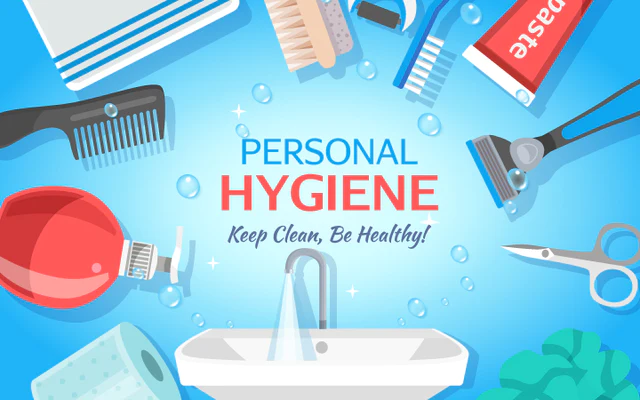Personal hygiene is an integral aspect of maintaining good health and promoting overall wellbeing. It encompasses a range of habits and practices that individuals adopt to keep themselves clean, prevent the spread of germs, and safeguard their physical and mental health. Practicing proper personal hygiene is not only essential for preventing illness and infections but also contributes to building self-confidence and a positive self-image. This article delves into the significance of personal hygiene, its various components, tips for establishing healthy hygiene routines, and the far-reaching benefits it brings to individuals and society as a whole.
The Importance of Personal Hygiene
Personal hygiene is fundamental for several reasons, including:
a. Disease Prevention: Regularly washing hands and maintaining cleanliness help reduce the transmission of infectious diseases, such as colds, flu, and gastrointestinal infections.
b. Infection Control: Proper personal hygiene is critical in healthcare settings to prevent the spread of infections from one patient to another.
c. Skin and Oral Health: Hygienic practices, such as bathing and brushing teeth, promote healthy skin and gums, preventing issues like rashes and dental decay.
d. Self-Esteem and Confidence: Good personal hygiene boosts self-esteem, allowing individuals to feel confident and comfortable in social interactions.
e. Psychological Wellbeing: Taking care of personal hygiene can have positive effects on mental health, reducing feelings of anxiety and improving overall emotional well-being.
Components of Personal Hygiene
Personal hygiene encompasses several essential practices, including:
a. Hand Hygiene: Regularly washing hands with soap and water or using hand sanitizers helps prevent the transmission of germs, especially before eating or after using the restroom.
b. Bathing and Showering: Regular bathing removes dirt, sweat, and bacteria from the skin, promoting cleanliness and preventing body odors.
c. Dental Care: Brushing teeth twice a day, flossing, and regular dental check-ups maintain oral health and prevent dental problems like cavities and gum disease.
d. Hair Care: Regular washing and grooming of hair help prevent scalp issues and maintain healthy hair.
e. Nail Care: Keeping nails clean and trimmed prevents the buildup of dirt and bacteria, reducing the risk of infections.
f. Clothing and Laundry: Wearing clean clothes and regularly washing them prevent the spread of germs and maintain overall cleanliness.
g. Menstrual Hygiene: Proper menstrual hygiene practices are essential for the health and well-being of menstruating individuals.
Establishing Healthy Hygiene Routines
To cultivate healthy personal hygiene habits, individuals can follow these practical tips:
a. Create a Routine: Establish a daily hygiene routine that includes regular bathing, brushing teeth, and washing hands at key times.
b. Use Appropriate Products: Selecting appropriate personal care products, such as soap, shampoo, and dental products, ensures effective hygiene.
c. Handwashing Technique: Practice proper handwashing by lathering hands with soap for at least 20 seconds, including the back of hands, between fingers, and under nails.
d. Dental Care: Brush teeth twice a day for two minutes each time, and don’t forget to floss daily.
e. Bathing Frequency: The frequency of bathing can vary depending on individual needs, but bathing at least a few times a week is generally recommended.
f. Dressing and Clothing: Wear clean clothes and change into fresh ones regularly, especially after engaging in physical activities.
g. Hair and Nail Care: Maintain regular hair washing, and keep nails clean and trimmed to prevent dirt buildup.
h. Menstrual Hygiene: Use appropriate menstrual products and change them regularly to maintain hygiene during menstruation.
The Wider Impact of Personal Hygiene
The practice of personal hygiene extends beyond individual benefits and positively impacts society and public health:
a. Disease Control: Good personal hygiene, especially handwashing, is critical in preventing the spread of infectious diseases within communities.
b. Workplace Productivity: Employers promoting personal hygiene in workplaces experience reduced absenteeism and improved productivity.
c. Healthcare Savings: Better personal hygiene leads to reduced healthcare expenses, as preventable infections and illnesses decrease.
d. Environmental Impact: Hygienic practices, such as proper waste disposal and handwashing, contribute to environmental health by reducing pollution and disease transmission.
e. Social and Cultural Norms: Personal hygiene practices are often influenced by cultural norms, and promoting hygiene awareness can lead to positive changes within communities.
Common Challenges and Solutions
While personal hygiene is vital, some individuals may face challenges in maintaining it. These challenges can include:
a. Lack of Access: Some communities may have limited access to clean water and sanitation facilities, making practicing personal hygiene more challenging.
b. Mental Health Factors: Individuals experiencing mental health issues may struggle to maintain personal hygiene routines. Support and understanding are crucial in such cases.
c. Cultural Beliefs: Cultural norms and beliefs may influence personal hygiene practices. Health education should be culturally sensitive to overcome such barriers.
d. Mobility Limitations: Individuals with mobility impairments may require assistance and adaptive tools to maintain personal hygiene independently.
Conclusion
Personal hygiene is an essential aspect of individual health and wellbeing. By incorporating good hygiene practices into daily routines, individuals can prevent the spread of infections, maintain oral and skin health, and boost their self-confidence. Moreover, proper personal hygiene has broader implications for public health and environmental well-being, making it a crucial aspect of creating healthier communities. By promoting hygiene education, ensuring access to sanitation facilities, and encouraging healthy practices, we can collectively foster a cleaner, healthier, and more prosperous world for everyone.

